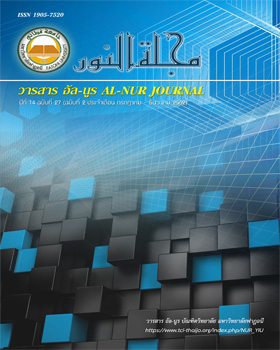A Student-Involvement of Video Production Model to Enhance English Listening and Speaking Skills. A case study of Undergraduate Students at a Thai Private Institution
คำสำคัญ:
Video Production, English Listening, English Speaking, UTAUT Modelบทคัดย่อ
This research aims to examine a student-involvement of video production model to enhance English listening and speaking skills of undergraduate students, and to evaluate student’s perception by the UTAUT Model (Unified Theory of Acceptance and Use of Technology). The mixed research design was used for this study, quasi-experimental research used for quantitative research method, pre-test and post-test for one group of student involvement of video production and qualitative research used for the study. Sixteen participants of undergraduate students in English tutorial class at Rajapark Institute (Yala Campus) were selected using purposive sampling, and the participants divided into four groups for focus group interviewed. The research instruments were English listening and speaking test, and the questionnaire with five Likert scales evaluate student’s perception by the UTAUT Model, and semi-structured questionnaire used for focus group interview which was chosen from the UTAUT Model. This research employed descriptive statistic and pair sample t-test for the data analysis. The hypotheses testing showed that after student-involvement of video production in English tutorial class, the result of English listening and speaking were statistically significant improved, and the student’s perception towards the UTAUT model (Performance Expectancy, Effort Expectancy, Social Influence, and Facilitating) indicated the overall of the students perception was at high level level in all aspects (= 3.78, SD = 0.31).
เอกสารอ้างอิง
Astin, A. W. (1984). Student involvement: A developmental theory for higher education. Journal of College Student Personnel, 25, 297-308
Lam, Y., & Lawrence, G., (2002). Teacher-student role redefinition during a computer-based second language project: Are computers catalysts for empowering change? Computer Assisted Language Learning,vol. 15, no. 3, pp. 295-315.
MUA, (2009). Thai Qualifications Framework for Higher Education. Retrieved June 25, 2016 from http://www.mua.go.th/users/tqfhed/news/FilesNews/FilesNews1/7.pdf
Plailek, T. (2011). Factors Effecting English Speaking Ability of Second Year English Major Students in the Faculty of Education, Rajabhat Universities in Bangkok Metropolitan Retrieved June 17, 2017 from http://www.universitypublications.net/jte/0401/html/DE4C356.xml
Sripathum, N., (2013). English-Teaching Problems in Thailand and Thai Teachers’ Professional Development Needs’ stated the conclusion of the study, English Language Teaching; Vol. 6, No. 11; 2013
Venkatesh V., Morris M., Davis G., Davis F. (2003). User acceptance of information technology: Toward a unified view. MIS Quarterly, 27, 425-478.



